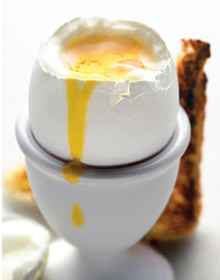Now that you know how to choose fresh from foul eggs, you need to learn the tricks of preparing the perfect egg.
Boiling eggs is a tried, tested, and true method of cooking eggs and perhaps the most elementary way to prepare proto-fowl, but even something as simple as boiling an egg can be complicated—eggs crack, they over cook, they undercook, and they get discoloured. This quick and elementary guide will provide you with tips and techniques for faultless eggs every time.
Soft-boiled
Soft-boiled eggs are a difficult to time perfectly. This is complicated by the fact that not everybody’s idea of what exactly constitutes a soft-boiled egg synchs up.
Wait till the water comes to a boil, and then turn the water down to a simmer; too roaring a boil and your egg might get cracked on the bottom of the pan. Cradle your egg in a spoon and sink it down to the bottom of the pan. Just dropping your egg into the pan nearly guarantees a crack.
Generic soft boiling times
- For a medium sized egg: 3 minutes for runny; 5 minutes for a medium-boiled egg (the yolk runs a bit in the centre, but everything else is pretty much solid). For large eggs add one minute to these cooking times, and for extra large eggs add one more minute to the cooking times.
Plunge the egg into cold water after removing it from the pan. This will stop the cooking process and keep the egg at your desired runniness.
Hard boiled
Unlike soft-boiled, the timing with hardboiled eggs is a little more flexible. Thus, if you are in a rush, you don’t have to wait for pot to come to a boil before plunging the egg into the watery depths (just add a 3 minutes to the cooking time). Once the water is boiling, reduce your heat to simmer, again insuring your precious cargo doesn’t crack.
- Boil your egg for 10-12 minutes (judge based on sized).
Once the eggs are boiled submerge them into a cold bath promptly. But why you ask? Boiled eggs can’t over cook can they? Well, not in the same way that soft-boiled eggs can overcook, but the eggs can develop dark green rings around the yolks if cooked on too high of a temperature or cooked for too long.
What are those dark green rings that appear around yolks? When eggs are overcooked, cooked at too high a temperature, or the cooking water is iron rich, then a green ring appears around the yolk. This green ring is a manifestation of the iron and sulfur compounds in the egg. It doesn’t affect the taste, but it’s unsightly for some egg dishes, and over cooking does compromise the integrity of the egg’s protein. Ultimately, it’s just not optimal.
So, what if my egg did crack, do I need to start over? Nope, if there’s a small crack on your egg just add a little vinegar to the cooking water. Vinegar prevents the egg white from seeping out of the egg. A common reason eggs crack is due to heat expansion. Rather than throwing your fridge cold eggs in a pot of boiling water, warm them up a bit! By placing your eggs in warm water for a few minutes while the water is coming to a boil you will insure crack free eggs (nearly) every time.
Is there ever a time I should crack my eggs? Some people like to put a small puncture with the tip of a knife into the air cell of the egg to reduce the likelihood of cracking. I think this is nonsense and leads to more cracked eggs and undesired omelets than necessary. There is one time that cracking your egg is essential: before allowing your hard boiled eggs to cool in a bath of cold water. Cracking the egg before cooling it will make future peeling a breeze.



